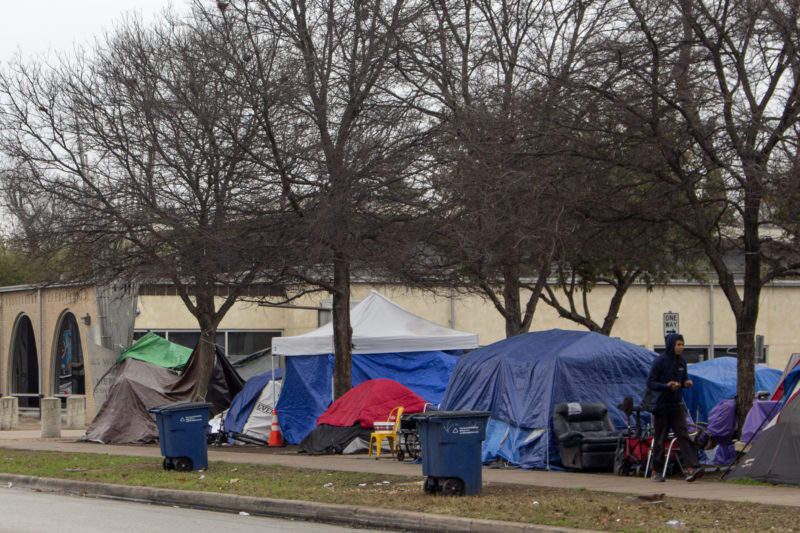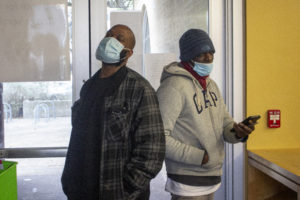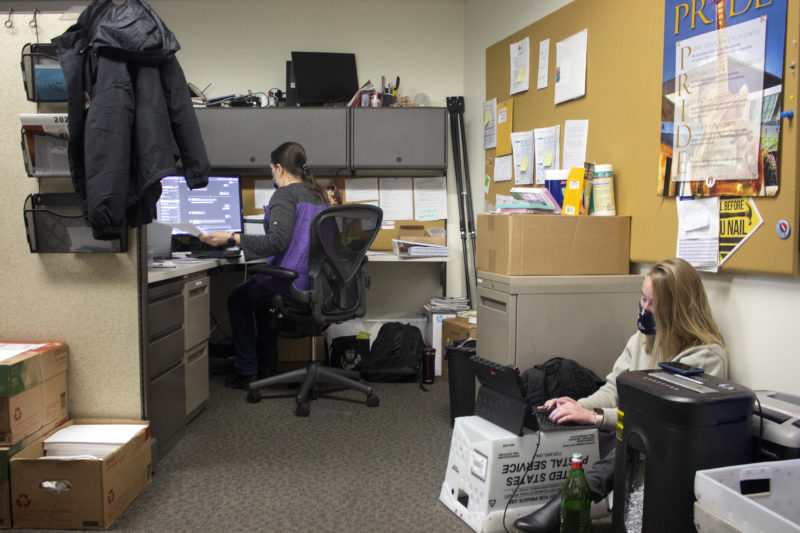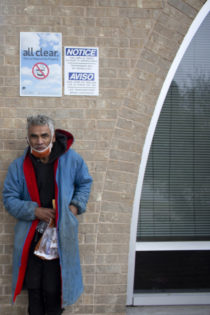Homeless People Face Waitlist for Services at Downtown Austin Community Court
By Mizelle Mayo
Reporting Texas

A pedestrian walks by the Terrazas Branch Public Library where it serves as the temporary location for the Downtown Austin Community Court in Austin, Texas, on Feb. 12, 2021, The court offers resources and counseling to public order offenders in the city. Samuel Bellessa/Reporting Texas
Shivering in a long coat with a plastic bag of sliced cold pizza in one hand, George Davis walks from his encampment on Willow Street to the Downtown Austin Community Court. It’s February and cold, and Davis wants to talk to his case manager about housing, job applications and even possibly getting a pair of gloves.
“I haven’t eaten in two days, and this is the coldest I’ve ever been,” Davis said.
Davis is among the luckier of people experiencing homelessness. About 200 unsheltered people are on a waiting list for the kind of intensive case management that Davis gets through the downtown court, which is temporarily located in the Terrazas Library at 1106 E. Cesar Chavez St. The court attempts to divert people charged with petty crime from the criminal justice system and to provide them with help getting their lives in order.

Charles Houston, 38, left, and Me-lon Springer, 57, visited the temporary Downtown Austin Community Court on Feb. 12, 2021 in Austin, Texas. Samuel Bellessa/Reporting Texas
The Ending Community Homelessness Coalition point-in-time count showed 2,506 people were homeless on Jan. 25, 2020, when the most recent count was taken. That was a 45% increase from 2019, the year Austin City Council lifted its camping ban. That growth, and the increasing visibility of homeless encampments — there’s a big one outside Terrazas Library, right by the court — led to a referendum on reimposing the camping ban. In the referendum on May 1, 57 % of voters chose to reinstate the ban.
The community court was established in 1999 and was the eighth community court in the U.S. and the first in Texas. Many of its clients are experiencing homelessness and tend to cycle through the criminal justice system. Initially, the court focused its efforts downtown, but it has since added East Austin and the West Campus area to its jurisdiction.
With an annual budget of $9.7 million, the court has grown from one to 20 specialists providing intensive case management. The court handles only Class C misdemeanors, which are the lowest level of crimes, punishable by a fine up to $500. Examples include traffic offenses, disorderly conduct, public intoxication and loitering.
Offenders have the option of paying the fine, doing community service or voluntarily entering the case management program. If they choose case management, they get credit for working on personal goals. Case managers help them with applying for an ID, SNAP benefits, mental health and substance abuse treatment and transitional and permanent housing.
In the year ending March 31, the triage case management provided walk-in services to over 10,000 requests for assistance and helped 58 individuals into stable housing.

Licensed master social workers Taryn Davis, left, and Bailey Gray work in a makeshift office at the Downtown Austin Community Court on Feb. 12, 2021. Davis and Gray provide resources and services to anyone who goes to the court. Samuel Bellessa/Reporting Texas
The court has been swamped lately, with a little more than 60 cases per day, almost all of them experiencing homeless. The clinical case managers cater to those experiencing homelessness, but services and financial assistance are available to all through DACC.
As these unsheltered people seek help for various services, the waitlists have grown.
Chris Anderson supervises the court’s case management staff. He said managers meet with clients “weekly, or several times a week, to continue working on all the goals they have.”
“It’s going to take them years of support and stabilization in order to be able to live independently again because they’ve had no support for five years, 10 years and so forth,” Anderson said.

George Davis, 53, visits the Downtown Austin Community Court to meet with his case manager on Feb. 12, 2021. Samuel Bellessa/Reporting Texas
Davis, 53 and a veteran, was originally from Houston but moved to Austin two years ago for work. Since the pandemic hit last year, he had been out of work and camping on Willow Street. He engaged with the downtown court after being charged with loitering. Davis has used the court services to apply for an ID and work toward transitional housing, he said.
The court contracts with various organizations to provide services for people experiencing homelessness. Groups like Integral Care help find solutions for housing and other issues the unsheltered population face. Integral Care provides mental health counseling, treatment for substance abuse disorders and services for people with intellectual and developmental disorders.
The organization has more than 900 employees and a $113 million budget. Ruth Ahearn, a patient administrator at Integral Care, said. Integral Care served 6,450 individuals experiencing homelessness in its 2020 fiscal year, up from 5,402 in 2019.
The downtown court and Integral Care have worked together for several years connecting folks to services that help them to get back on their feet. Integral Care also provides specialized teams for outreach and engagement with the unsheltered population.
The downtown Integral Care team is hiring five new members, including rehabilitation specialists and two psychiatrists.
“We’ll be able to expand our capacity for the team and really start enrolling new clients at a good pace,” Ahearn said.
Davis one day would like to see his family again in San Antonio. His wife passed away several years ago from cancer, but his son still lives in San Antonio with a family of his own.
“To find myself fighting overseas for this country to be greeted to this coming back is sad,” Davis said. “I’m hoping I can find a home here soon or find a way to visit my son.”

Clients exit the Downtown Austin Community Court’s temporary location at the Terrazas Branch Public Library on E. Cesar Chavez Street in Austin, Texas. Samuel Bellessa/Reporting Texas